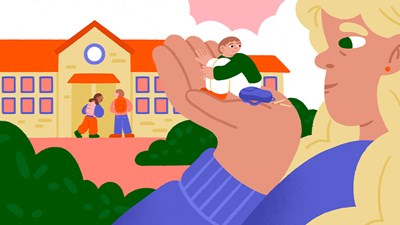How to talk to your child about relationships

You might feel awkward. But there are ways you can make it easier:
1. Find a good time to start a conversation.
Your child should feel relaxed and confident they won’t be interrupted. You could try talking when you’re:
- on a walk together
- in the car (they might feel less pressure if you’re not looking directly at them)
- the only people at home.
2. Make the conversation relevant
That could be by using their experience of learning about sex and relationships in school or talking about a famous couple. Or if you've been watching a TV series or film together and one of the characters is in a relationship. Think of open-ended questions to ask, like:
- What do your friends think?
- What do you think?
- What do you think about the relationship?
- Do you think the relationship is healthy or unhealthy?
3. Don’t rush. Let your child take their time.
It can help to have a few short conversations rather than trying to cover everything at once. If your child feels uncomfortable, let them know that you’re there whenever they’re ready to talk.
Watch three parents discuss how to talk to children about sex and relationships to keep them safe.
What is a healthy relationship?

A healthy relationship is one where your child:
- feels safe
- respects their partner and feels respected
- trusts their partner and is trusted
- can be honest
- can maintain good communication with their partner
- can stay calm during arguments
- has an even power balance with their partner (eg they’re similar ages)
- shares an understanding of consent with their partner.
Worried about a child?
You can contact the NSPCC Helpline by calling 0808 800 5000, emailing [email protected] or completing our report abuse online form.
Support if you're worried about your child's relationship
Realising that your child may be involved in an unhealthy relationship is upsetting and worrying. We can help you to spot the signs of an unhealthy relationship. And support you with what to do if you’re worried.
Signs that a child might be in an unhealthy relationship are:
- spending little time with family or friends
- being told what to wear
- always needing to let the person know where they are or what they’re doing
- having their social media accounts monitored
- feeling like they have to do things they’re uncomfortable with. This could include being pressured into sex or to send nudes or sexual images
- having their money, access to food or day-to-day items controlled
- feeling reluctant to go to school or college
- being prevented from working or going to school or college
- persistent changes to a child's mood or behaviour can be a sign that something's wrong
- being bullied or experiencing sexual bullying, either online, in private or in front of others at home or in school.
If you’re worried a child or young person might be experiencing grooming, sexual, emotional or physical abuse, it’s important to get help right away. Our trained helpline counsellors can offer support and advice over the phone on 0808 800 5000 or online. Children and young people can also contact Childline to get support themselves.
Talking to children about consent
Discussing sex and relationships with children can help keep them safe and empower them to recognise the signs of abuse. We have advice to help you start the conversation below. It can also help to speak to teachers at your child's school about the topics being covered in sex and relationships education. Then you could consider how to talk about this at home.
When talking to your child about sex and relationships, it's really important that you:
- help them to feel supported by listening openly and non-judgementally
- let them know they can talk to you if anything has happened that they’re upset by.
Talking to your child about sex while they’re still in primary school will help you to work out their level of understanding and encourage them to ask questions. Don’t lecture your child. Talk together and listen.
For children aged 5-11, Talk PANTS is a simple conversation starter. From P through to S, each letter of PANTS provides a simple but valuable rule that can help keep your child safe.
As your child grows up, you could try:
- having short, informal chats now and again
- using everyday situations to start a conversation, such as seeing a pregnant woman or discussing stories in the news
- using humour if it makes things easier.
Encourage your child to make safe choices about sex. As children get older, it’s important to talk about:
- sexually transmitted infections (STIs)
- contraception.
Children are generally taught these topics in secondary school, so it’s helpful to know they can talk about them with you too. Let them know you're there for them if they have questions or concerns.
Childline has advice for young people about pregnancy, STIs, contraception, and safe sex.
It's important to talk to children and young people about consent.
You can help them to understand that consent in relationships is about feeling in control. Saying yes or agreeing to sexual activity should be an active choice. Not something that happens because of being pressured. Remember, sexual activity can be in person or online.
Consent means actively saying yes, using both words and body language.
- Explain to your child that they should always check the other person is happy to have sex or take part in sexual activity of any kind.
- If the other person's body language and behaviour change, check in. They should stop if they think the other person is uncomfortable or unhappy.
- A partner has a right to change their mind. Even if they’ve agreed to sexual activity or sex before.
- Reassure them that they can talk to you if they feel pressured or unsure about sex or sexual activity.
If they're worried that an image of them has been shared online, they can use our Report Remove tool to have it taken down.
Childline has advice to help young people understand healthy and unhealthy relationships.
Consent can be complicated, and sometimes, it can be hard for a young person to recognise what's okay and what's not. We can help if you're worried about a young person's sexual behaviour.
The law
The age of consent, or the legal age to have sex in the UK, is 16. The laws are there to protect children and not to prosecute those under 16 who agree to engage in sexual activity together.
Any sort of sexual contact without consent is illegal, regardless of the age of those involved. Children under 13 cannot legally consent to any sexual activity.
Starting conversations about relationships and sex can sometimes mean a child shares a distressing experience. This can be upsetting or shocking for parents and carers, but there are things you can do to help a child feel supported.
Show you care and help them to open up
Give the child your full attention and listen without interrupting. Be compassionate and reassure them that their feelings are important.
Slow down and take your time
Let the child talk at their pace, and don't interrupt them while they're talking. Try not to rush them and let them know that they can speak to you again at another time. They may not be comfortable sharing everything straightaway. Sometimes, it can take several conversations for them to tell you everything.
Show you understand
Show that you're interested in what your child's telling you, and check if you're unsure by repeating back what they've told you. Use the words they’ve said to show you empathise with their experience.
We have more advice to help you know how to respond if a child discloses abuse.
Support for young people from Childline
- Healthy and unhealthy relationships - advice on the signs of unhealthy relationships and consent.
- Relationships - advice for young people starting relationships.
- Sex - how to know when you're ready, consent and safe sex.
- Sexting - advice for young people on sharing and sending nude images.
More advice for parents and carers
Illustration credits
Top banner and page body illustrations by Harriet Nobel.
Parenting advice row: see individual pages for details.






